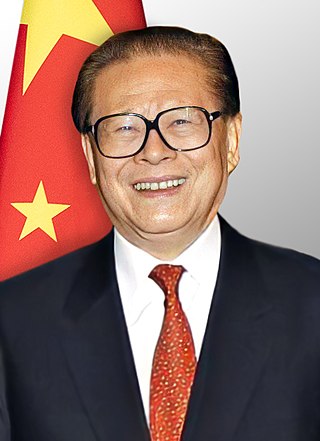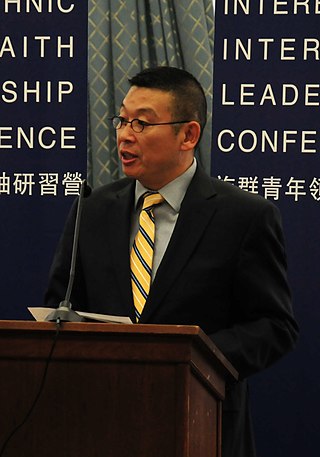
Jiang Zemin was a Chinese politician who served as general secretary of the Chinese Communist Party (CCP) from 1989 to 2002, as chairman of the Central Military Commission from 1989 to 2004, and as president of China from 1993 to 2003. Jiang was paramount leader of China from 1989 to 2002. He was the core leader of the third generation of Chinese leadership, one of four core leaders alongside Mao Zedong, Deng Xiaoping and Xi Jinping.

Yang Jianli is a Chinese dissident with a United States residency. He is the son of a Communist Party leader. Yang was detained in China in 2002 and was released in 2007. He now lives in the United States, where he is a human rights activist.

Ching Cheong is a senior journalist with The Straits Times. He is best known for having been detained by the People's Republic of China on allegations of spying for Taiwan. He was imprisoned from April 2005 to February 2008; spending over 1,000 days in prison.
He Depu is a dissident in the People's Republic of China.
The Democracy Party of China is a political party that started in the People's Republic of China, and was banned by the Chinese Communist Party (CCP). The history of the DPC and its foundation date is unclear because it has many historical paths under different groups of founders. According to western sources, it is generally recognized to have assembled in 1998 by democracy activists and former student leaders from the 1989 Tiananmen Square protests.
Shi Tao is a Chinese journalist, writer and poet, who in 2005 was sentenced to 10 years in prison for releasing a document of the Communist Party to an overseas Chinese democracy site. Yahoo! China was later discovered to have facilitated his arrest by providing his personal details to the Chinese government. Yahoo! was subsequently rebuked by a panel of the U.S. Congress, settled a lawsuit by Shi's family out of court, and pledged to reform its practices.
A cyber-dissident is a professional journalist, an activist or citizen journalist who posts news, information, or commentary on the internet that implies criticism of a government or regime.

Bao Tong was a Chinese writer and activist. He was Director of the Office of Political Reform of the Central Committee of the Chinese Communist Party (CCP) and the Policy Secretary of Zhao Ziyang. He was also Director of the Drafting Committee for the CCP 13th Party Congresses, known for its strong support of market reform and opening up under Deng Xiaoping. Prior to this, he was a committee member and then deputy director of the Chinese State Commission for Economic Reform. During the 1989 Tian’anmen square protests, he was one of the very few Chinese senior officials to express understandings with the demonstrating students, which led to his arrest shortly before the June Fourth incident.
Jiang Lijun is a Chinese freelance writer. He has been detained by the Chinese government since November 2002 for posting articles on the Internet which the government considered subversive. He is a native of Tieling in Liaoning.
Zhao Yan is a Chinese researcher employed by the Beijing bureau of The New York Times. He was imprisoned for a three-year period starting 17 September 2004, on charges of fraud, after originally being arrested for revealing state secrets. According to the BBC, he was released on 15 September 2007.
Ouyang Yi is a former high-school teacher, one of the managers of a pro-democracy web site, and a member of the China Democracy Party.
Zhao Changqing is a history teacher and political activist in the People’s Republic of China.
Li Zhi is a Chinese dissident. He worked as a civil servant in Dazhou. He was arrested in 2003 for his postings of information on local corruption on the Internet.
Guo Quan is a Chinese human rights activist. He founded the China New Democracy Party. He is a State Owned Enterprise cadre, secretary of the Nanjing Economic Restructuring Commission and Nanjing People's Court cadre.
Charter 08 is a manifesto initially signed by 303 Chinese dissident intellectuals and human rights activists. It was published on 10 December 2008, the 60th anniversary of the Universal Declaration of Human Rights, adopting its name and style from the anti-Soviet Charter 77 issued by dissidents in Czechoslovakia. Since its release, more than 10,000 people inside and outside China have signed the charter. After unsuccessful reform efforts in 1989 and 1998 by the Chinese democracy movement, Charter 08 was the first challenge to one-party rule that declared the end of one-party rule to be its goal; it has been described as the first one with a unified strategy.
This is a list of political offences in China. During the Maoist era, particularly during the Anti-Rightist Movement and the Cultural Revolution, the judicial system of China was often used for political persecution of rivals, and penalties such as jail terms or capital punishment were largely imposed on the authority's political enemies, or anyone who attempted to challenge it. During those times, vague accusations such as "counter-revolutionary", capitalist roader (走资本主义路线), "running dog of the imperialist " (帝国主义走狗) could have had the accused imprisoned, or shot by firing squad. These labels fell out of use following the end of the Cultural Revolution in 1976.
Liu Xianbin, from Suining, Sichuan province, People's Republic of China, is a human rights activist, China Democracy Party organizer, writer and signer of Charter 08.
Events in the year 2012 in China.
Yang Rudai was a politician of the People's Republic of China (PRC). He served as the Communist Party Chief of Sichuan, then China's most populous province, and was the first native Sichuanese to become the top leader of the province since the founding of the PRC. He was a member of the 13th Politburo of the Chinese Communist Party, the top governing body of China. Yang was considered a protégé of the purged reformist leader Zhao Ziyang.
Socialism with Chinese characteristics is a set of political theories and policies of the Chinese Communist Party (CCP) that are seen by their proponents as representing Marxism–Leninism adapted to Chinese circumstances and specific time periods, consisting of Deng Xiaoping Theory, Three Represents, Scientific Outlook on Development, and Xi Jinping Thought. In the CCP's view, Xi Jinping Thought is considered to represent Marxist–Leninist policies suited for China's present condition while Deng Xiaoping Theory was considered relevant for the period when it was formulated.



